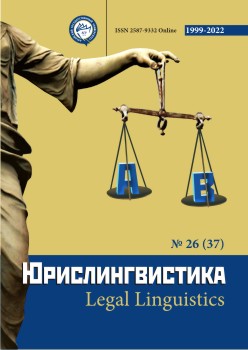Conceptualization of Resistance to Information Threats in the Internet Environment via Special Legal and Forensic Linguistic Knowledge
УДК 340.69:81 ББК 67.539
Abstract
This article presents the current results of the scientific project “Conceptualization of countering information threats in the Internet environment using special legal and forensic linguistic knowledge”, the purpose of which at this stage was to develop the basis of the theory of information security in the Internet environment, to develop the criteria that allows to determine the malicious, criminogenic and destructive nature of information materials freely distributed in the Internet environment, to construct a typical diagnostic complex of criminogenic speech action. The scientific research integrates such areas of scientific knowledge as, on the one hand, forensic expertology, information law, forensic science, criminology, criminal law, civil law and other branch legal sciences and, on the other hand, semasiology, applied linguistics, language theory and other branches of philological science.
The necessity of further research of the problems of ensuring information security in the digital environment has been substantiated. The foundations of the theory of information security of Internet communication have been laid on the basis of an integrated legal and linguistic approach. The obtained results of the project can be used in legislative, law enforcement, and forensic activities.
Downloads
Metrics
References
Galyashina E.I. The Extremist Internet Discourse: Legal, Scientific and Practical Aspects of Forensic Linguistic Analysis / Theory and Practice of Forensic Science. - 2020. - № 15 (2). - C. 81-90.
Galyashina E.I., Nikishin V.D. The Concepts of Aggressive Information Impact through the Lens of Internet Users’ Worldview Security / Journal of Siberian Federal University. Humanities & Social Sciences. - 2021. - № 14 (11). - P. 1660-1673.
Galyashina E.I., Nikishin V.D. The protection of megascience projects from deepfake technologies threats: information law aspects / Journal of Physics: Conference Series. - 2022.- Volume 2210.
Galyashina E.I., Nikishin V.D., Bogatyrev K.M. Media security protection: new methodology for authorship examination of the Internet discourse / European Proceedings of Social and Behavioural Sciences: International Conference on Language and Technology in the Interdisciplinary Paradigm (LATIP 2021). - 2021. - Volume 118. - P. 601-610.
Богатырев К.М. Медиабезопасность в цифровой среде: криминалистический аспект / Теория и практика расследования преступлений. Материалы IХ Международной научно-практической конференции. Краснодар, 2021. - С. 292-296.
Богатырев К.М. Формирование частной теории использования специальных знаний в целях обеспечения информационно-мировоззренческой безопасности в цифровой среде / Актуальные проблемы российского права. - 2021. - Т. 16. - № 10 (131). - С. 124-134.
Галяшина Е.И. Использование специальных знаний для обеспечения мировоззренческой медиабезопасности / Теория и практика судебной экспертизы в современных условиях: материалы VIII Международной научно-практической конференции. М.: РГ-Пресс, 2021. - С. 54-58.
Галяшина Е.И. Использование специальных знаний для противодействия угрозам информационной безопасности интернет-коммуникации / Вестник криминалистики. - 2020. - № 2 (74). - С. 24-29.
Галяшина Е.И. Концепция информационной (мировоззренческой) безопасности в интернет-медиа в аспекте речеведческих экспертиз / Вестник Университета имени О.Е. Кутафина (МГЮА). - 2020. - № 6 (70). - С. 33-43.
Галяшина Е.И. Криминогенные речевые действия, посягающие на мировоззренческую безопасность в интернет-среде, в аспекте судебной лингвистической экспертизы / Судебная экспертиза. - 2020. - № 1 (61). - С. 34-44.
Галяшина Е.И., Никишин В.Д. Деструктивное речевое поведение в цифровой среде: факторы, детерминирующие негативное воздействие на мировоззрение пользователя / Lex russica. - 2021. - Т. 74. - № 6 (175). - С. 79-93.
Галяшина Е.И., Никишин В.Д. Криминалистические диагностические комплексы экстремистских речевых действий как отправная точка совершенствования антиэкстремистского законодательства / Законы России: опыт, анализ, практика. - 2021. - № 3. - С. 14-19.
Галяшина Е.И., Никишин В.Д., Богатырев К.М. Типовые криминалистические диагностические комплексы криминогенных речевых действий / Судебная экспертиза. - 2021. - № 1 (65). - С. 16-31.
Никишин В.Д. Речеведческие компетенции как основа юридико-лингвистического обеспечения информационно-мировоззренческой безопасности интернет-коммуникации / Международные и национальные тенденции и перспективы развития судебной экспертизы: сборник докладов II Международной научной конференции, г. Нижний Новгород, 21–22 мая 2020 г. Нижний Новгород: ННГУ. - 2020. - С. 213-220.
Никишин В.Д. Цифровые и речевые следы в аспекте обеспечения информационной (мировоззренческой) безопасности в интернет-среде / Судебная экспертиза. - 2020. - №1 (61). - С. 131-139.
Никишин В.Д., Галяшина Е.И. Юридико-лингвистический подход к исследованию поликодовых текстов криминогенной коммуникации в цифровой среде в целях обеспечения информационной (мировоззренческой) безопасности / Актуальные проблемы российского права. - 2020. - Т. 15. - № 6. - С. 179-193.
Copyright (c) 2022 Елена Галяшина, Владимир Никишин, Константин Богатырев

This work is licensed under a Creative Commons Attribution 4.0 International License.
The authors, which are published in this journal, agree to the following conditions:
1. Authors retain the copyright to the work and transfer to the journal the right of the first publication along with the work, at the same time licensing it under the terms of the Creative Commons Attribution License, which allows others to distribute this work with the obligatory indication of the authorship of this work and a link to the original publication in this journal .
2. The authors retain the right to enter into separate, additional contractual agreements for the non-exclusive distribution of the version of the work published by this journal (for example, to place it in the university depository or to publish it in a book), with reference to the original publication in this journal.
3. Authors are allowed to post their work on the Internet (for example, in a university repository or on their personal website) before and during the review process of this journal, as this may lead to a productive discussion, as well as more links to this published work (See The Effect of Open Access).











